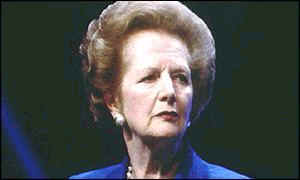Margaret Thatcher
From dKosopedia
Born Margaret Hilda Roberts in 1925, daughter of a Grantham grocer. Studied chemistry at Oxford and worked as a research chemist and tax lawyer before entering Parliament in 1959. Served as Minister of Education and Science under Prime Minister Edward Heath, when her unpopular abolition of free milk for schoolchildren earned her the epithet "Maggie Thatcher, milk snatcher". Elected leader of the Conservative Party in 1975 following a general election defeat.
Economic stagnation and trade union strife propelled her into No. 10 in 1979; the quotation of St. Francis of Assisi on her first day in Downing Street was a glimpse of the messianic cult of personality that was already established, would define British politics in the Eighties and ultimately lead to her downfall. Thatcher's first term saw a biting recession drive unemployment to over three million, mostly affecting the regional manufacturing base rather than the more affluent southeast. She won the subsequent general election in 1983 by a landslide due to her strong party discipline, almost complete support from the print media, a divided opposition and the bounce from victory in the Falklands War against Argentina.
Thatcher changed the nature of the British Conservative Party. The cycle of British governance through the 20th century had generally taken the pattern of a single Labour term with a flurry of progressive legislation, followed by several terms of steady-as-she-goes Tory rule. Conservative electoral success had never relied on strong personality, with the war-time exception of Winston Churchill, and the abandonment of this approach has meant the Tories have not successfully adapted to a post-Thatcher world. Thatcher dismissed the more moderate Tories who expected to be appointed to her government as 'wets' and pursued a hard-right agenda that came to be known as Thatcherism. This was influenced by the monetarism advocated by Milton Friedman that sought to control inflation, and featured stringent trade union legislation, tax cuts, the sale of council houses to their tenants (admittedly, a generally popular policy), centralization of control of government spending and large scale privatization. Like other strong leaders in British history such as Churchill and the Duke of Wellington, Thatcher used force to break strikes: the most infamous example was the Coal Miners Strike of 1984-1985. Among the industries sold off were telecoms, gas, oil, air travel, steel, water and electricity.
In 1989, after winning a record third term in 1987, Thatcher introduced her flagship policy of reorganized local taxation dubbed the 'Community Charge', or Poll Tax. This was unfair and hugely unpopular, saw many people choose to be sentenced to jail terms rather than pay and provoked the 1990 Poll Tax Riot of more than a quarter of a million demonstrators, which featured the aggressive police action and surveillance permitted by Thatcher's public order legislation. The poll tax, her self-proclaimed intransigence ("The lady's not for turning"), her regal announcement on the birth of a grandchild ("We are a grandmother") and her increasingly shrill anti-European pronouncements (towards the end, a speech on European integration in Parliament featured her repeatedly shouting "No!" - the Iron Lady had become the bag lady) all pointed to one conclusion. She was too crazy to win an election. A spurned former minister Michael Heseltine challenged for the leadership and, wounded and not quite sure what was happening, she retired. John Major won the second round of voting.

![[Main Page]](../../../../upload/banner-blue-135.jpg)